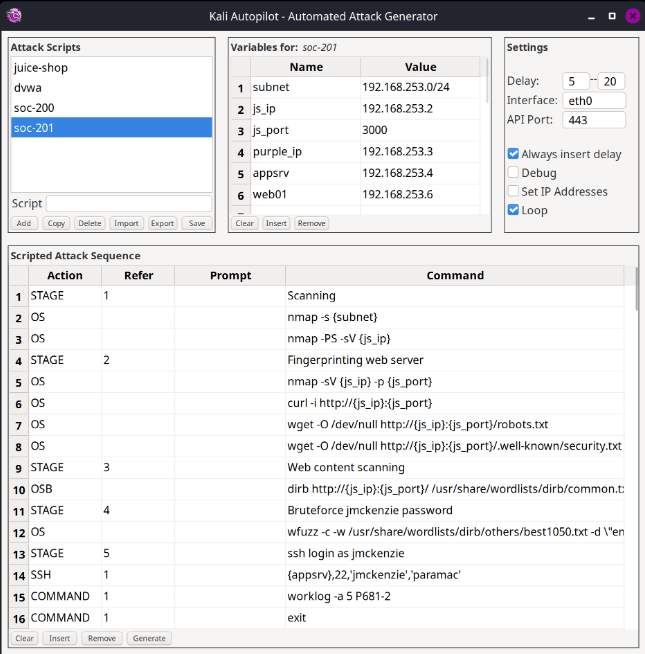
Just a few months prior, 2023.2 was released with some neat improvements. And again a new version of Kali Linux has been released that Kali Linux 2023.3 focuses more on back-end.
Kali Linux 2023.3 is overhauling the project’s internal infrastructure stacks. The goals are to simplify and standardize key components like Debian 12, Cloudflare for CDN/WAF, Nginx web server, and Ansible for infrastructure as code.
Kali is also automating more processes such as testing package builds and migrating packages between versions with the release of Kali Autopilot, which was first released with Kali Purple in Kali 2023.1.
Highlights:
- Internal Infrastructure – Major stack changes is under way
- Kali Autopilot – The automation attack framework has had an major overhaul
- New Tools – 9 new tools added this time round!
Internal Infrastructure & Autopilot
Kali Autopilot
Kali Autopilot is an automated attack framework. It is a bit like an “AutoPwner”, which follows pre-defined “attack scenarios”. The motivation originally started its development for the defensive side of Kali.
Kali Autopilot consists of a GUI tool to design attacks and to generate attack scripts that perform those attack sequences, either manually or as a service, together with a web API interface for remote control. You can also download example attack scripts from the Kali Purple Hub. We currently have scripts for juice-shop and DWVA. Just download the JSON from the hub and import it into Kali Autopilot.
It is a lot easier to demonstrate Kali’s offensive side, especially when you start seeing the shells popping up.
But when it comes to the defensive side, how do you know if you have set things up?
- Are the Intrusion Detection System (IDS) and the Web Application Firewall (WAF) detecting malicious activities?
- Is the Security information and event management (SIEM) ingesting the right logs?
- Are the dashboards and alerts tuned to detect attacks?
- Are the analysts trained in finding the needle in the haystack?
- Has it been tested? How can you test?
Either you can wait for someone to try and break in, or you could do it yourself. This is where Kali Autopilot comes in.

New 9 tools introduced by Kali Linux 2023.3
- Calico – Cloud native networking and network security
- cri-tools – CLI and validation tools for Kubelet Container Runtime Interface
- Hubble – Network, Service & Security Observability for Kubernetes using eBPF
- ImHex – A Hex Editor for reverse engineers, programmers and people who value their retinas when working at 3 AM
- kustomize – Customization of kubernetes YAML configurations
- Rekono – Automation platform that combines different hacking tools to complete pentesting processes
- rz-ghidra – Deep ghidra decompiler and sleigh disassembler integration for rizin
- unblob – Extract files from any kind of container formats
- Villain – C2 framework that can handle multiple reverse shells, enhance their functionality and share them among instances
Along with some new tools, there are numerous packages and libraries added to Kali, both minor and major version such as: Greenbone, Humble, Impacket, jSQL, OWASP, ZAP, Rizin, Tetragon, theHarvester, Wireshark and many many more.
Packaging Tools
- AutoPkgTest – Using
debciin a CI fashion, we can test packages being built.- This integrates into Britney.
- Britney2 (Git repo) – Migrates packages between all of our suites (aka branches, such as “debian-testing”, “kali-rolling”, and “kali-last-snapshot” to name a few).
- Build-Logs – Output of our images/platform as well as packages being created on each supported architecture.
- Janitor – This is our automated packager as it will apply everything from minor formatting changes to preparing an package update.
- The long term goal of this is to have it handle kali-bleeding-edge, linking into AutoPkgTest.
- Package Tracker – Tracks each packages version’s history.
- Packaging CI Overview (Git repo) – Quick (and dirty) overview of our package’s CI status.
- Upstream-Watch (Git repo) – Monitors when there is an update upstream.
How to Install Kali Linux 2023.3
You can download Kali Linux directly from the KALI LINUX website.
If you are already having the old version of Kali Linux, you can update your KALI version by the following commands:
┌──(kali㉿kali)-[~]
└─$ echo “deb http://http.kali.org/kali kali-rolling main contrib non-free non-free-firmware” | sudo tee /etc/apt/sources.list
[…]
┌──(kali㉿kali)-[~]
└─$ sudo apt update && sudo apt -y full-upgrade
[…]
┌──(kali㉿kali)-[~]
└─$ cp -vrbi /etc/skel/. ~/
[…]
┌──(kali㉿kali)-[~]
└─$ [ -f /var/run/reboot-required ] && sudo reboot -f

